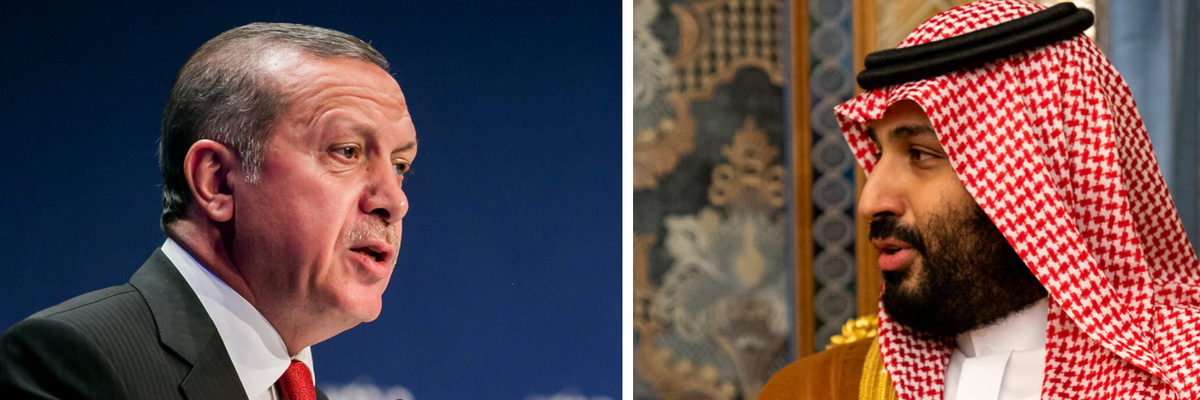President Recep Tayyip Erdogan has decided to sacrifice Turkish efforts to seek justice for the brutal murder of Washington Post columnist Jamal Khashoggi, apparently in hopes of attracting Saudi financial support and investment for Turkey’s inflation-ravaged economy.
That appears to be what’s behind the sudden announcement by the lead prosecutor in the trial in abstentia of 26 Saudis indicted for Khashoggi’s murder that the case should be moved to Saudi Arabia. The Saudi chief public prosecutor’s office had requested the transfer, and evidently the Turkish courts are planning to comply.
The decision reflects Erdogan’s apparent desire to improve Turkish-Saudi relations and reap the financial rewards, as he has with the UAE, specifically with Abu Dhabi’s Crown Prince Mohammed bin Zayed. The two leaders recently visited each others’ capitals, ending a decade of hostility culminating in Abu Dhabi’s announcement that it intended to make $10 billion in new investments in Turkey.
The Turkish-Emirati rivalry reflected tensions left behind by the political upheaval of the 2011 Arab Spring. Erdogan sought to support newly elected Islamist governments in Tunisia and Egypt and provide assistance to Islamist actors vying for power from Libya to Syria. In contrast, both the UAE and Saudi Arabia actively worked to undermine the effectiveness of Islamist-led governments and to bolster counter-revolutionary forces throughout the region in the aftermath of the mass protests of that year.
The UAE and Saudi Arabia blamed both Turkey and Qatar for supporting Islamist movements around the region, a fear that prompted them, along with Bahrain and Egypt, to initiate a blockade against Qatar in June 2017, with the initial approval of the Trump administration. The Saudi decision to lift the blockade following Biden’s election, and the subsequent detente within the Gulf Cooperation Council, established a trend toward enhanced diplomacy across the region throughout 2021, including rapprochement between Turkey and the UAE.
Yet Turkish-Saudi relations have remained strained since Khashoggi’s murder and dismemberment in the Saudi consulate in Istanbul in October 2018. At the time, the Turkish media’s slow and steady release of information helped to maintain attention on the gruesome story, while subsequent investigations by Turkish authorities concluded that the hit team was closely linked to, if not ordered by, the kingdom’s de facto leader, Crown Prince Mohammed bin Salman. With the announcement that Turkish courts will no longer seek to hold Khashoggi’s murderers accountable, it seems clear that Erdogan has decided to prioritize his political future over the pursuit of justice in the Khashoggi killing.
Erdogan has held power as either prime minister or president of Turkey since 2003. Erdogan and the AK party’s electoral strength derived primarily from Turkey’s economic growth throughout much of his tenure, driven in part by massive investments in construction, funded by foreign credit and a gaping current account deficit. The pitfalls of this approach became clear during the Turkish debt crisis in 2018, when the value of the Turkish lira plummeted, touching off an inflationary spiral that reached 54 percent in February. In 2018, the ruling AK party lost its majority in the Turkish National Assembly, and with general elections just 14 months away, Erdogan’s political future may depend on securing new sources of foreign investment and financial support.
In addition to his efforts to improve ties with the Saudis and Emiratis, Erdogan has also looked to ameliorate relations with Israel, which have been tense for over a decade. In 2010, a flotilla of Turkish ships carrying thousands of tons of humanitarian aid sought to break Israel’s blockade of Gaza; the Israeli military intervened to stop them and killed ten civilians in doing so.
Since then, Erdogan frequently highlighted the plight of Palestinians while providing diplomatic support to Hamas, including offering the party’s leaders sanctuary in Turkey. Israel responded by allying with Turkey’s rival Greece as well as the Republic of Cyprus, holding joint military drills, and partnering on gas exploration in the eastern Mediterranean.
The recent visit to Ankara by Israeli President Isaac Herzog signals a reset in Erdogan’s stance. Despite the preceding decade of acrimony, Turkish-Israeli ties are long-standing: Turkey was the first Muslim-majority country to recognize Israel in 1949, and, encouraged by the administration of Ronald Reagan, its military developed particularly close ties with the Israel Defense Forces during the 1980’s. Despite Erdogan’s efforts to champion the Palestinian cause and support Islamist movements around the region, Turkish-Israeli business ties remained strong.
Given the emerging degree of cooperation between Israel, the UAE, Saudi Arabia, and the U.S. against Iran, Erdogan’s recent efforts to pursue closer ties with each of these countries may reflect not only his interest in winning foreign investment but a strategic calculation about the future balance of power in the region.
















